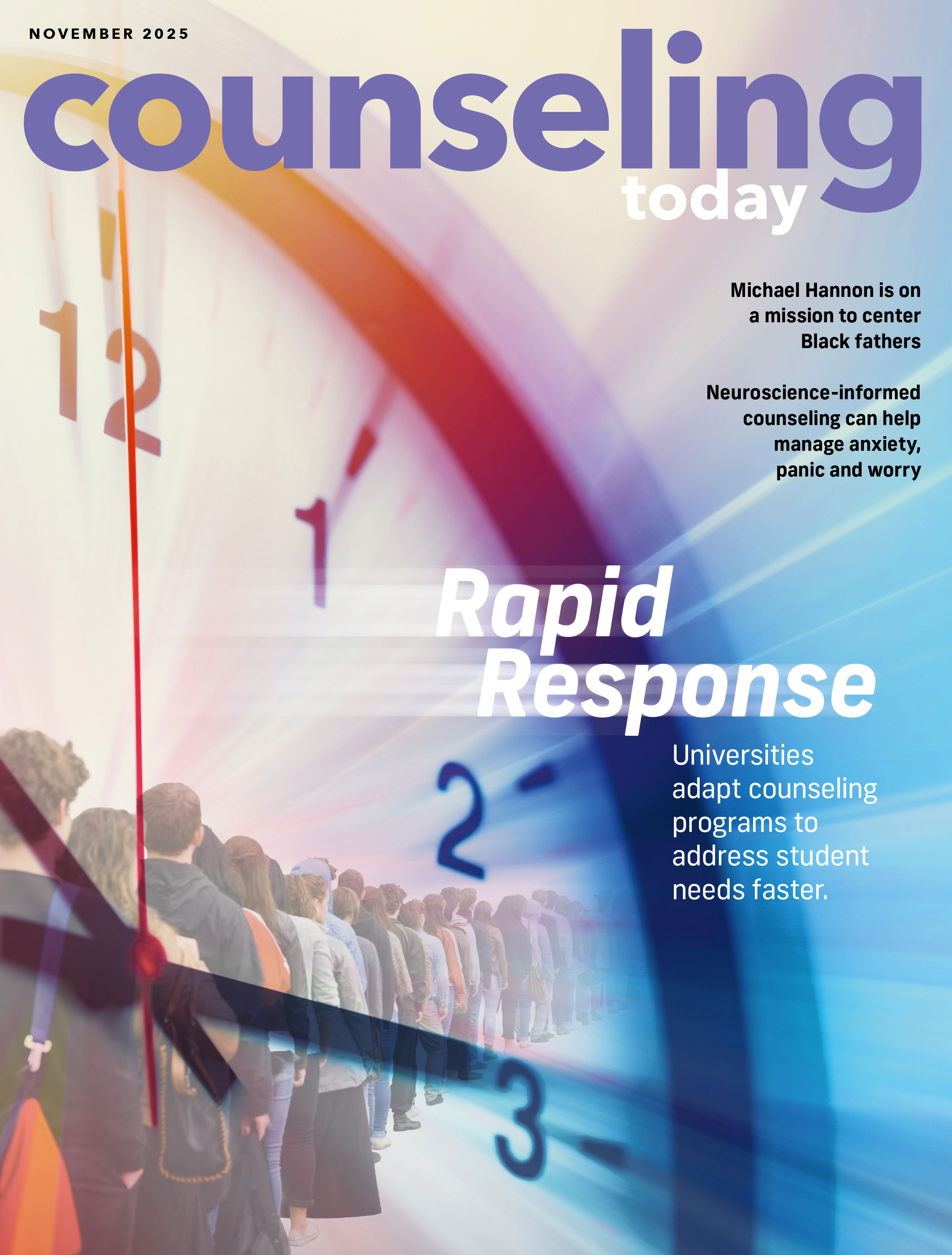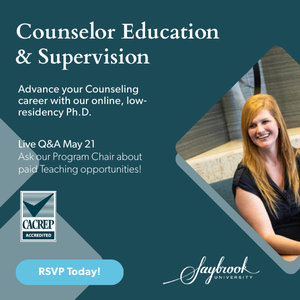Explore Counseling Today Articles
Recognizing burnout and compassion fatigue among counselors
When I was younger, I had a deep desire to be a crucial part of others’ lives, to help people unpack their emotions and difficult memories. I wanted to hold a sacred space for individuals to open up and share their traumatic experiences. As a result, when I was a teenager, I constantly pondered why a part of other people’s pain stayed with me. Why did I feel their pain, and what could I do to help them?
Early on in my counseling career, I realized that burnout and compassion fatigue are real issues that affect many counselors globally. While counselors help to heal clients’ diverse mental health issues, our own lives can be filled with unexpected ups and downs. Recognizing burnout and compassion fatigue before they set in has served as a saving grace for me while facing the harsh moments of our current realities.
Burnout vs. compassion fatigue
As mental health counselors, we have a professional responsibility to ensure that our clients are safe. At the same time, we have a personal responsibility to look after our own mental health. Burnout can occur easily when these two aspects get out of balance, and sometimes we tend to ignore the early symptoms, which include the following:
- Anger
- Frustration
- Negativity
- Withdrawal
- Fatigue
- Cynicism
Burnout stems from deep exhaustion and a lack of motivation due to overexertion. Compassion fatigue, however, comes from the fatigue caused by dealing with others’ trauma and sufferings, and it is common in any type of profession that focuses on helping others. Here are some of the warning signs of compassion fatigue:
- Avoidance
- Addiction
- Detachment
- Sadness
- Grief
- Lack of intimacy
It can be difficult to determine if you are experiencing burnout or compassion fatigue. As a counselor, you will experience compassion fatigue when you are overwhelmed from focusing too much on others’ well-being and unable to manage their stress. If you have constant headaches, distressed feelings, unwanted thoughts and increased irritability that are affecting your overall life, you are likely experiencing compassion fatigue.
If you feel hopeless about the nature of your work and feel it has little positive impact on your life, however, you are probably experiencing burnout and are overworked. Burnout often occurs if you work long hours, are undercompensated for your workload and are short of some quintessential tools. These factors place you under extreme stress.
Tips to prevent burnout
As counselors, it is vital to understand that our lives can’t be free of stress. Instead, we can notice repetitive patterns caused by our compulsive habits that can lead to burnout. The key is to recognize unhealthy patterns and habits early on before they exert a stronger grip on us. '
Here are some tips to prevent burnout:
- Engage in your own personal therapy if needed.
- Maintain a strong support system of friends, family members and fellow therapists. Also, let your supervisor know if you are experiencing any signs or symptoms of burnout; they can help you delegate your responsibilities and ensure you are taking time for self-care.
- Partake in regular physical exercise, long walks, meditation and yoga, and invest in your morning and bedtime routine.
- Spend time journaling and subscribe to a health care model that offers 360-degree attention to spiritual, emotional, mental, physical and vocational aspects of individual wellness.
- Create work-life balance by ensuring the number of hours spent at work is closely equivalent to the number of hours invested in a conscious, meaningful and relaxing self-care activity.
- Get outdoors, take a mental health day for self-care, work closely with a mental professional to engage in self-care, and get together with your fellow counselors for a counseling retreat or in-person/virtual groups.
- Find a buddy who can help identify and alert you when your stress meter has gone up. This tip is important because often as counselors, we carry stressful work situations or unsatisfactory client encounters with us in our minds. We repeatedly replay them in our heads to analyze and dissect how they could have gone better. This stress and feelings of resentment can spill into our personal space and affect the time we spend with family members and friends.
- Join professional associations such as the American Counseling Association that can help counselors become part of the wider community and stay on track with their healing.
Tips to combat compassion fatigue
Counseling involves welcoming clients from diverse cultural backgrounds and helping them hold their inner peace. As counselors, we show compassion, and in this process sometimes we over-empathize, which can lead to compassion fatigue. Compassion fatigue often sneaks up on us, and if we are unaware or not vigilant, it can leave us feeling physically exhausted, numb, sad, stuck and withdrawn. To avoid compassion fatigue, counselors need to adopt some healthy practices such as:
- Establish healthy habits such as getting adequate sleep, eating nutritious food and engaging in grounding activities (e.g., meditation, yoga).
- Establish and maintain purposeful connections with friends, family members and fellow therapists. These relationships can serve as a great reminder of your authentic self.
- Create meaningful boundaries with fellow counselors, clients and family members. This is especially important in the helping professions where everyone expects you to lend them a compassionate ear.
- Find a way to disconnect from our clients’ stories. Sometimes clients’ stories stay with us even after we leave the session, and we may unconsciously project our own thoughts, feelings or biases onto clients. To avoid this, engage in a short mediation for about 10 minutes before and after each session, which can help counselors disconnect and prepare for the next session.
- Develop a consistent meditation practice. I am a meditation teacher, and I have received several emails from therapists and healers expressing gratitude for my daily online guided meditation sessions.
- Work toward becoming more mindful. Mindfulness in daily life keeps the mind alert and focused and ready to absorb more. It also protects the mind from being affected by traumatic stories.
- Practice self-care. You cannot pour from an empty cup. Some ways we can take care of ourselves include engaging in relaxation techniques, healthy friendships, enjoyable hobbies and healthy stress outlets.
- Maintain a healthy work-life balance. It is important to establish a manageable work schedule; know what kind of clients trigger you deeply and take precautions beforehand.
- Engage in personal counseling. Talking to a therapist about your triggers and instances from the past when you have experienced compassion fatigue can help immensely.
- Establish emotional boundaries. There is a common tendency among mental health professionals to slip into over-involvement and to forget to create emotional boundaries with others. But these boundaries are important because they help us to value our space, which is necessary for our recovery.
- Commit to staying educated. It is important to learn about compassion fatigue and to stay abreast of its symptoms and remedies.
Self-care as second nature
No one is immune to suffering in this world, not even counselors. In navigating from one client to another — and often helping clients deal with a lot of suffering — we can carry residual energies from previous sessions. Hence, cleansing ourselves becomes crucial so that we are not affected in the long run.
We are often busy as counselors helping others, seemingly leaving us very little time for our own recovery and self-care. But it is equally important for us to indulge in self-inquiry and ask ourselves: “How often am I sitting with my discomfort? If I am not doing this, then why not?” Do we find it challenging to “heal” ourselves or is it that we often get so focused on helping others that we forget to take care of yourselves? Do we tend to put others first (before ourselves)?
After engaging in this self-reflection, counselors may discover that self-care does not come naturally to them. Because they have a natural inclination toward helping others, caring for the self can feel like an additional task. Being fully aware of this attitude may help counselors build a deeper relationship with themselves and release the notion that they cannot seek help themselves. Here are some questions to you become more aware of your self-care practice and areas you need to work on to change how you approach self-care in your life:
- How often have you found yourself comfortable in your discomfort?
- While you are trying your best to heal others, who is helping you?
- Who is listening to you?
- Is your mental health a priority or has it taken a backseat?
- Who is devoted to you when you are devoted to everyone else around you?
There is often a gap between how we are visualizing our ideal life in our heads versus how we are living life in reality. The power of self-care is often underestimated, and it is time for us to change this attitude as counselors.
Listening to ourselves
As counselors, we invest a lot of our time, energy and emotions in working with others. Deeply listening to others and helping others untangle their wired thoughts is an art. We bring the best out in others as we remind them of their positivity, strengths and resilience. But amid this process of healing others, we mustn’t forget to listen to our needs as well.
Flight attendants always advise airplane passengers that in case of emergency, each person should put on their own oxygen mask before trying to help others. This approach is equally applicable to us in the helping professions, where the goal is to help those in distress.
Being emotionally attuned and available to ourselves as counselors is of vital importance. We must respect our boundaries, nurture our health first and continuously monitor ourselves for any early signs of stress. Because we are instrumental in healing others, we carry a great responsibility to stay attuned to our authentic selves and prioritize our needs. After all, if your cup is empty, how can you truly hope to help and support others?
Hence, it is crucial to refill your cup as soon as you feel you are verging closer to burnout or compassion fatigue. Don’t wait for your inner batteries to die down completely before taking steps to recharge them.
Counselors can find support from other mental health professionals. In 2018, I built a virtual platform called Soulful Conversations, which allows counselors to have heart-to-heart conversations and helps them to better cope with burnout, compassion fatigue and mental unrest. This provides mental health professionals with a space to share their advice, best practices, life-changing experiences expertise on dealing with burnout and compassion fatigue. These videos are available on my YouTube channel, Soulful Conversations With Madhuri Govindu.
As I said in one of the Soulful Conversation sessions, “If you cannot nourish your soul, you cannot ignite the well-being of others.” Before trying to heal others, we must first ensure that we are healed and nourished within ourselves.
Madhuri Govindu is a counseling psychology graduate student at Pennsylvania Western University at Edinboro. She is also a meditation teacher, yoga enthusiast and influencer. Her work was featured in The New Indian Express in 2018 when she began to invite individuals from all walks of life to embrace the present moment through her open social change platform titled Soulful Conversations. Contact her at madhurigovindu23@gmail.com.
The views expressed in Counseling Today are those of the authors and contributors and may not reflect the official policies or positions of the editors or the American Counseling Association.
- Professional Counseling
- Wellness & Self Care
- Counselors
Search CT Articles
Filter CT Articles
Current Issue
Sign Up for Updates
Keep up to date on the latest in counseling practice. Sign up to receive email updates from Counseling Today.



